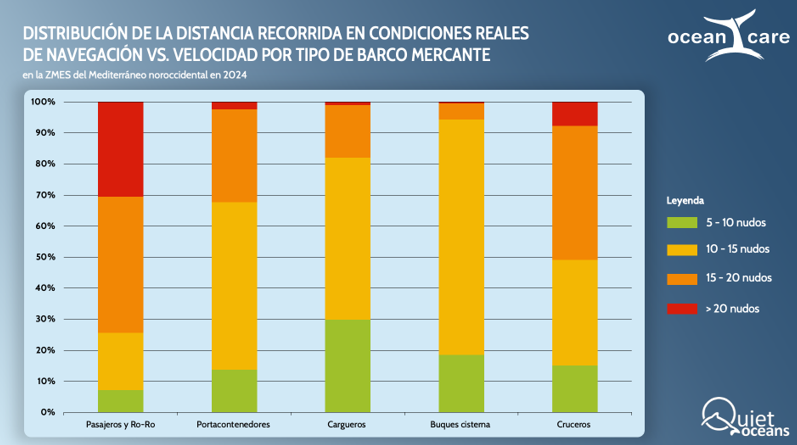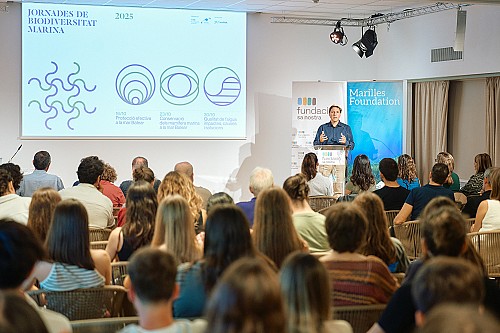Navigation speed in the north-western Mediterranean remains unchanged despite the risk of collision with cetaceans
Published 02.10.2025
Share

A comparative analysis of maritime traffic data from 2023 and 2024 highlights the need to establish mandatory speed limits to protect endangered whales.
Collisions with vessels are the main human-induced cause of death for large whales in the north-western Mediterranean, particularly the fin whale and the sperm whale, both listed as endangered by the International Union for Conservation of Nature (IUCN).
In 2023, the International Maritime Organization (IMO) approved the designation of this area as a Particularly Sensitive Sea Area (PSSA) to address this serious problem and reduce the risk of fatal collisions. It also introduced a voluntary measure recommending ships to reduce their speed to 10–13 knots. The best available scientific data indicates that the likelihood of a collision being fatal to a whale is very low when the vessel’s speed does not exceed 10 knots.
The north-western Mediterranean PSSA includes the Cetacean Migration Corridor, an area of high ecological value designated by Spain in 2018 as a marine protected area (MPA) and, in 2019, as a Specially Protected Area of Mediterranean Importance (SPAMI) under the United Nations Barcelona Convention.
Despite the IMO’s designation of this PSSA, a comparative analysis of data on distances covered by vessels - according to different speed ranges - during their passage through the area in 2023 and 2024 shows that shipping companies are not adopting the IMO’s recommendations to reduce speed. Consequently, there remains a serious risk of vessel collisions with large whales (fin and sperm whales), with potentially fatal consequences.
According to the data analysis commissioned by OceanCare and carried out by Quiet Oceans, the overall navigation behaviour of vessels, particularly in terms of average speed, has remained stable across both years. Of the nearly 48 million kilometres travelled by all vessels navigating within the PSSA in 2023 and 2024, 57% of the total distance was covered at speeds above 10 knots, with no significant variation between the two years (56.9% in 2023 and 57.5% in 2024).
For the six main categories of merchant vessels, over 80% of the total distance travelled (equivalent to more than 25 million kilometres) was at speeds above 10 knots (84.8% in 2023 and 82.8% in 2024). When focusing on ferries, both passenger and roll-on/roll-off (Ro-Ro) cargo ferries, this proportion slightly exceeded 90% in both years. Ferries travel the greatest distances at high speeds, making them a significant source of both underwater noise and collision risk.
Reducing vessel speed has multiple positive effects on the environment. In addition to lowering the risk of fatal whale collisions and reducing underwater noise, it significantly cuts CO₂ emissions and atmospheric pollutants such as sulphur oxides (SOx), nitrogen oxides (NOx), particulate matter, and black carbon, with immediate effect and at minimal cost.
“The Spanish government must approve a management plan to effectively regulate human activities that threaten the Mediterranean Cetacean Migration Corridor MPA, whose aim is to safeguard critical habitats for endangered species such as the fin whale and the sperm whale. Although the process is already underway and the plan’s publication is expected by June 2026, it is several years behind schedule,” they added.
The Ministry for Ecological Transition and Demographic Challenge (MITECO), in coordination with the Ministry of Transport and Sustainable Mobility (MITMS), is leading the development of the management plan through a participatory process involving civil society. Several environmental organisations - including Alnitak, Bluewave Alliance, ClientEarth, Ecologistas en Acción, Greenpeace, GOB Mallorca, Marilles Foundation, Mission Blue, Oceana, OceanCare, Save The Med, and WWF -are calling for the inclusion of a mandatory vessel speed reduction throughout the entire MPA/SPAMI as an urgent measure to mitigate collisions and underwater noise.
Specifically, they are requesting:
- The implementation of a general mandatory speed limit of 10 knots for all vessels, including recreational boats, navigating within the territorial scope of the Mediterranean Cetacean Migration Corridor.
- That exceptions to this 10-knot limit involve:
- Designing, with the support of relevant scientific studies, a Traffic Separation Scheme (TSS) under which merchant vessels would be required to sail at a reduced speed relative to their average operational speed, by a percentage to be determined for each vessel category, based on scientific and technical research.
- Establishing a mandatory speed reduction - determined through appropriate scientific studies - that maximises collision risk reduction without compromising service quality for ferries operating as part of public service routes and already following fixed trajectories.
To date, the request has been endorsed by 60 experts from the scientific and legal fields and was delivered to the Vice-President and Minister for Ecological Transition and Demographic Challenge, Sara Aagesen, during the UN Ocean Conference (UNOC3) in June 2025.
During this event, Vice-President Aagesen confirmed her commitment to establishing measures to reduce vessel speeds within the MPA/SPAMI. A joint working group has also been created between MITECO, MITMS, economic sectors, and NGOs to define concrete speed-reduction measures.
The organisations trust that this mechanism will lead to balanced solutions reconciling environmental protection with the needs of maritime transport. The group’s first, and so far only meeting took place on 26 May in Madrid. The organisations involved have called for the urgent reactivation of this working group.


